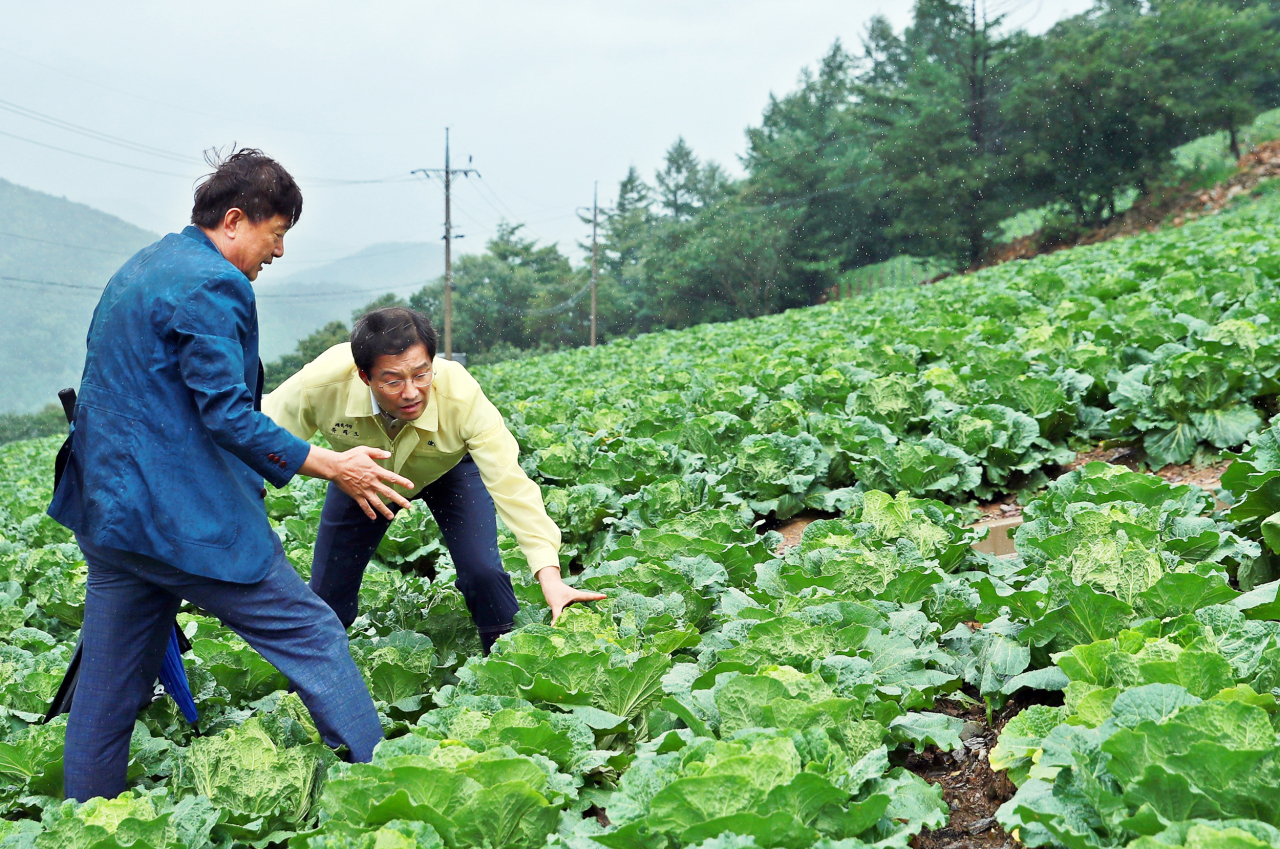 |
Taebaek Mayor Ryu Tae-ho (right) checks on napa cabbages in Taebaek, Gangwon Province on Thursday. (Yonhap) |
Consumers would face higher shopping cart prices this week, due to spikes in wholesale prices of various kinds of produce during the prolonged rainfall over weeks, according to the retail industry on Sunday.
The unexpectedly prolonged rainfall is taking a toll on many of the country’s farm villages, which have damaged their crops and cut supplies, leading to spikes in agricultural prices.
According to the data from Korea Agro-Fisheries&Food Trade, leafy vegetables such as cabbage, lettuce and napa cabbage, have seen their wholesale prices jump by about 60 to 107 percent as of Thursday compared to the previous month.
The increased wholesale prices have directly been reflected to retail prices.
Emart, a leading supermarket chain here said the price of one napa lettuce was 3,980 won ($3.35) on Thursday, up 21 percent from 3,300 won two weeks ago.
Lettuce from Nonsan, South Chungcheong Province, which was sold at 2,200 won for 200 grams early last month, soared 35 percent to 2,980 won on Thursday.
The heavy rainfall that has been continuing over weeks has damaged many farms, and has also hindered the delivery processes of produce, leading to increases in prices, according to the industry.
Although overall price increases seem inevitable, the retail industry says it is working to maintain retail prices at affordable levels and secure sufficient supplies of agricultural products.
“Following the increases in wholesale prices, large retailers are striving to secure supply from regions less damaged by the flooding, so that we can offer products at prices less affected by the price jump,” an Emart official told The Korea Herald.
This year, the cooler weather during the lengthened rainy season has also dampened the ice cream industry.
According to Lotte Confectionery, the snack producer operated by Lotte Group, its sales of ice cream products dropped by 5 percent in July, compared to the same period last year. Binggrae also saw its monthly sales to go down by 3 percent in July, on-year.
Lotte Foods, which is another food arm producing ice cream products under Lotte Group, said its sales went down by 1 percent in July, on-year, while Haitai Icecream witnessed its sales decrease by 7 percent.
In the first quarter of this year, Lotte Confectionery secured 32.5 percent of the ice cream market share and Bingrae ensued with 27.9 percent, according to Nielsen Korea. Lotte Food came in third with 14.1 percent and Haitai Icecream with 12.2 percent in the market.
Binggrae acquired Haitai Icecream, previously a subsidiary of Haitai Confectionery & Food, in April.
By Jo He-rim (
herim@heraldcorp.com)





![[KH Explains] For Korean automakers, Chinese EVs may loom larger than Trump’s tariffs](http://res.heraldm.com/phpwas/restmb_idxmake.php?idx=644&simg=/content/image/2024/11/14/20241114050537_0.jpg)
![[Graphic News] Tainan predicted top destination for South Koreans in 2025](http://res.heraldm.com/phpwas/restmb_idxmake.php?idx=644&simg=/content/image/2024/11/13/20241113050807_0.gif)

